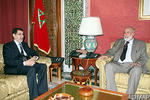The National Democratic Institute (NDI) held a workshop for political parties on 1 March at Tripoli’s Rixos Hotel, at which the . . .[restrict]specific date for the elections to the constituent assembly was announced. It is Wednesday 20 June.
According to the organisers, 32 parties were invited, including members of Libya’s Election Committee and Abdallah Naker’s newly-launched Al-Qimma (“The Pinnacle”) party.
About 115 people and 30 parties were present at the workshop where Josh Mills, NDI’s political party and communications specialist, opened proceedings. “Parties don’t divide nations, they liberate them”, he began. “It took the US 200 years to develop its democracy…and it still gets it wrong sometimes. There are rules for election campaigns and no party wants to break these laws. Therefore, this workshop is a chance to learn more about them.”
Carlo Binda, NDI country manager, noted that “as political parties, you will have differences, but you will also have common ground on which to unite. You will need to come together, as a group to present a united voice to the Election Committee”.
Lamin Belhaj, member of the Election Committee, then gave a detailed presentation of the Committee’s work. However, he could not help but recall in his opening remark that he was “happy to be here in this very room and hotel that was used by the previous regime for propaganda”, and that he was “talking about elections which was an imprisonable offence”.
The job of the Election Committee was threefold, he explained: To draw up the election law, to form the Election Commission and to decide on the election districts. The districts were based on a balance between population and geographical spread.
There are to be 120 seats for the western region spreading from Sirte to Ras Jedir, 60 seats for the east from Sirte to Msa’id, 29 for the south and 9 for the central region.
He stressed that there was an attempt to divide the districts so that they represented an equal number of people – but in realty it was not possible to achieve the average target of 26,000 people per district. The districts were divided on the bases of the 2006 population census, he explained.
He admitted that in some high density population areas such as Tripoli, districts can have up to 41,000 people in them, whilst in low density geographically spread areas it could drop to as low as 9,000 people per district.
They decided to officially call parties standing for elections ‘political entities’ as the election could be entered by three different entities: single political parties, coalitions of parties and groups of independent individuals. Every Libyan would have be able to vote twice, once for the list and once for an individual in a ‘non-transferable voting bases’.
Belhaj forecast that some districts would therefore have only one representative elected, whilst others would have more. In his opinion, “the list system will help smaller parties”.
One of the biggest issues facing the committee was the issue of who qualifies as a ‘Libyan’. He informed the gathering that Libya “has seven means of identification”. These were: passport, the newer green Family Book, the old blue Family Book, the ID card, the driving licence, the National Number and a receipt for any lost form of identity.
He confirmed the widely held view that “there is a high rate of fraud or counterfeit in forms of identity”. Therefore the Election Committee had decided to resort to the Civil Register as a means to solve this problem and create an Electoral Register. However, he revealed that “30 percent of the Civil Registry documentations were destroyed”.
As for the vexing problem of the Libyan nationality being distributed illegally “to thousands” by the previous regime, he admitted that the committee was “still studying this”.
Belhaj also admitted that there were challenges facing them, but that as far as they were concerned, “elections will be held on 20 June”. He added independent election commission could to ask the NTC to postpone the elections — “if it sees fit”. But he stressed the NTC was not considering postponement.
He also revealed it had been decided to lower the age for candidates standing in the election to 21, so as to allow greater participation by young people.
“Any law issued for political parties he explained will be for the June 2012 elections only”, he added. He also stressed that as far as the Election Committee was concerned, it was taken as a given that political parties can exist by virtue of the transitional constitution.
The biggest challenge facing Libya in the elections was in his opinion the issue of ‘awareness’. “We need an awareness campaign for Libyan citizens. The last election Libya had was in 1964 – which were not very fair and transparent.”
Regarding the sensitive issue of who should stand for elections for important positions in the new Libya, he made it clear that it was not within the remit of his Election Committee. He predicted that at least some members of the old regime would make their way into the Constitutional Assembly. It was up to the “Integrity and Patriotism Committee to decide” on that issue he explained.
As regards the equally important issue of funding, Belhaj concluded his detailed presentation by saying that the law for “political entities will insist on transparency with regards to sources of funding”.
There then followed an answer and question session, from which one of the main points to emerge was the need for further such gatherings to explain to the general public and discuss with it the contents of the Election Committee’s presentation. [/restrict]







